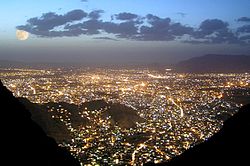2020 suicide bombing in Quetta, Pakistan
| January 2020 Quetta bombing | |
|---|---|
| Part of the insurgency in Balochistan and War on Terror in Pakistan | |
| Location | Quetta, Balochistan, Pakistan |
| Date | 10 January 2020 |
| Target | Taliban-run mosque [1] |
Attack type | Suicide bombing |
| Weapons | Suicide vest |
| Deaths | 15 (+1 suicide bomber) |
| Injured | 19+ |
| Perpetrators | Islamic State – Pakistan Province |

On 10 January 2020, a suicide bombing inside a Taliban-run mosque killed at least 15 people in Quetta, Pakistan. [1] [2] At least 19 others were injured. [3] [4] [1]
